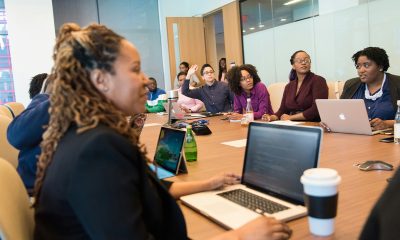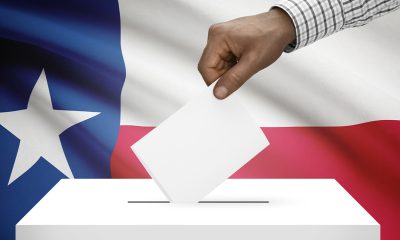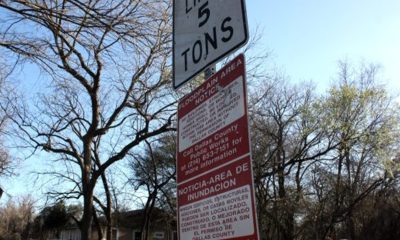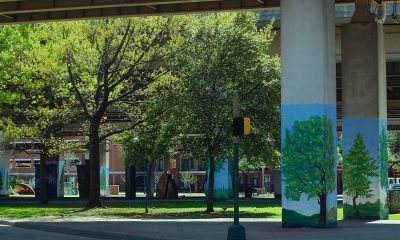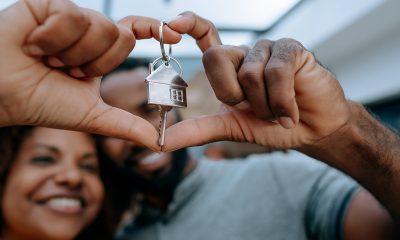Featured
Passion in 1st Meeting of Black Women Organized for Political Action in Napa

From left to right: K Patrice Williams, President; Latressa Wilson Alford, Vice President; Danette Mitchell, Secretary; Peggy Cohen Thompson, Political Educator Director, the Honorable Dezie Woods-Jones, State Board President; and Cassandra Joebert, Regional BWOPA Director. Not pictured Shontell Beasley, Treasurer.
By Danette Mitchell
A week ago, more than 50 women of color from diverse backgrounds, varying ages, marital status, including same-sex relationships, community, and political involvement — all gathered from Solano and Napa counties with exuberant anticipation, passion and pride to celebrate the inaugural meeting of Black Women Organized for Political Action (BWOPA) Solano/Napa County chapter — joining seven other nonpartisan BWOPAs in Northern California.
K. Patrice Williams, a 2017 honoree of Congressman John Garamendi’s Women of the Year award and the newly-elected chapter president, said the event felt historical. It was “inspiring and moving to see women of color coming together to meet for one united purpose and committed to having a greater voice in both Solano and Napa counties and seeing the support of men.” Williams said one of the “brothers” indicated that he is a longtime supporter of BWOPA. A husband attended to support his wife.
Williams said that many African Americans are frustrated with low voter turnout and the low to none minority elected representation in many of the cities in Solano County. Some of the goals of the chapter are to increase voter registration and issue engagement in the African-American community and increase the number of black women appointed to boards, commissions, and political offices through education, endorsements, and campaign support.
Committees were formed to begin the work, including one made up of young people to expose them to the political process. Officers were sworn in by Hon. Dezie Woods-Jones, State Board president and one of the founders of BWOPA in 1968. In Jones’ welcome address, she said everything we do is political and that others are making decisions and creating public policy on black women’s behalf.
African Americans and especially black women must be engaged in the process, and sit at decision-making tables to speak for themselves and continue work that remains.
Jones mentioned education, health care, criminal justice and economic security. She pointed out that black women outvoted all other race and gender subgroups yet are the least represented.
She concluded her remarks by saying that African-American women must be unapologetically black and come to political tables with power, strength, purpose, vision, research, and knowledge. They must also educate other black women who have a willingness to make a difference and to make things happen in the local community.
The mission of BWOPA is to activate, motivate, promote, support and educate African-American women about the political process, encourage involvement and to affirm a commitment to, and solving of, those problems affecting the black community in Solano and Napa counties and challenges that are unique to black women.
In 2011, writer, political science professor, and former MSNBC talk show host Melissa Harris-Perry published a book, “Sister Citizen,” using the subtitle “For Colored Girls Who’ve Considered Politics When Being Strong Isn’t Enough.” She adapted her subtitle from Ntozake Shange’s choreopoem, “For Colored Girls who have considered suicide/when the rainbow is enuf.” According to Perry, Shange’s work is a representation of the experience of the crooked room.
Perry said black women have attempted to stand upright in a room made crooked by the stereotypes about African-American women as a group, warped images of their humanity, and derogatory assumptions about their character and identity. Black women have always had to attempt to preserve their authentic selves and to secure recognition as citizens. When confronting both race and gender, African-American women must strategize an upright position.
Some black women managed to tilt and bend themselves to fit the distortion, said Perry, that further exacerbated the distortions, resulting in self-inflicted wounds and justification. However, throughout black women’s political history, African-American women found a way to discern the distortion and shift the angle of the crooked room amid unspoken experiences of hurt, rejection, and their search for identity.
In an interview with Jones, after the BWOPA event, she said the political process is, therefore, not foreign to black women. African-American women have always been barred from achieving full equality as citizens. Yet many of the issues experienced impacts other communities and when black women are free, everyone else is free.
BWOPA does not exclude anyone, Jones said. She is excited about the new BWOPA chapter, and the appointment of talented and creative women to the board who have a passion for serving others and effecting change. Jones invites others to join in their endeavor to impact the Solano and Napa counties by attending the next meeting scheduled for Nov. 11.
Danette Mitchell is a social issues advocate, writer and a Vacaville resident. Email: damitchell@earthlink.net.
Activism
Oakland Post: Week of April 17 – 23, 2024
The printed Weekly Edition of the Oakland Post: Week of April 17 – 23, 2024

To enlarge your view of this issue, use the slider, magnifying glass icon or full page icon in the lower right corner of the browser window. ![]()
Activism
Oakland Schools Honor Fred Korematsu Day of Civil Liberties
Every Jan. 30, OUSD commemorates the legacy of Fred Korematsu, an Oakland native, a Castlemont High School graduate, and a national symbol of resistance, resilience, and justice. His defiant stand against racial injustice and his unwavering commitment to civil rights continue to inspire the local community and the nation. Tuesday was “Fred Korematsu Day of Civil Liberties and the Constitution” in the state of California and a growing number of states across the country.

By Post Staff
Every Jan. 30, OUSD commemorates the legacy of Fred Korematsu, an Oakland native, a Castlemont High School graduate, and a national symbol of resistance, resilience, and justice.
His defiant stand against racial injustice and his unwavering commitment to civil rights continue to inspire the local community and the nation. Tuesday was “Fred Korematsu Day of Civil Liberties and the Constitution” in the state of California and a growing number of states across the country.
One OUSD school is named in his honor: Fred T. Korematsu Discovery Academy (KDA) elementary in East Oakland.
Several years ago, founding KDA Principal Charles Wilson, in a video interview with anti-hate organization “Not In Our Town,” said, “We chose the name Fred Korematsu because we really felt like the attributes that he showed in his work are things that the children need to learn … that common people can stand up and make differences in a large number of people’s lives.”
Fred Korematsu was born in Oakland on Jan. 30, 1919. His parents ran a floral nursery business, and his upbringing in Oakland shaped his worldview. His belief in the importance of standing up for your rights and the rights of others, regardless of race or background, was the foundation for his activism against racial prejudice and for the rights of Japanese Americans during World War II.
At the start of the war, Korematsu was turned away from enlisting in the National Guard and the Coast Guard because of his race. He trained as a welder, working at the docks in Oakland, but was fired after the bombing of Pearl Harbor in 1941. Fear and prejudice led to federal Executive Order 9066, which forced more than 120,000 Japanese Americans out of their homes and neighborhoods and into remote internment camps.
The 23-year-old Korematsu resisted the order. He underwent cosmetic surgery and assumed a false identity, choosing freedom over unjust imprisonment. His later arrest and conviction sparked a legal battle that would challenge the foundation of civil liberties in America.
Korematsu’s fight culminated in the Supreme Court’s initial ruling against him in 1944. He spent years in a Utah internment camp with his family, followed by time living in Salt Lake City where he was dogged by racism.
In 1976, President Gerald Ford overturned Executive Order 9066. Seven years later, the 9th Circuit Court of Appeals in San Francisco vacated Korematsu’s conviction. He said in court, “I would like to see the government admit that they were wrong and do something about it so this will never happen again to any American citizen of any race, creed, or color.”
Korematsu’s dedication and determination established him as a national icon of civil rights and social justice. He advocated for justice with Rosa Parks. In 1998, President Bill Clinton gave him the Presidential Medal of Freedom saying, “In the long history of our country’s constant search for justice, some names of ordinary citizens stand for millions of souls … To that distinguished list, today we add the name of Fred Korematsu.”
After Sept. 11, 2001, Korematsu spoke out against hatred and discrimination, saying what happened to Japanese Americans should not happen to people of Middle Eastern descent.
Korematsu’s roots in Oakland and his education in OUSD are a source of great pride for the city, according to the school district. His most famous quote, which is on the Korematsu elementary school mural, is as relevant now as ever, “If you have the feeling that something is wrong, don’t be afraid to speak up.”
Community
For Cervical Cancer Month, Medical Community Focused on Education
January was Cervical Cancer Awareness Month. Physicians, advocates and others in the medical community commemorated the month by raising awareness about a form of cancer they say is highly preventable and treatable. Cervical cancer is caused by a virus called the human papillomavirus (HPV) and it develops slowly over time but can be prevented with proper care in girls as young as 13 years old.

By Magaly Muñoz
January was Cervical Cancer Awareness Month.
Physicians, advocates and others in the medical community commemorated the month by raising awareness about a form of cancer they say is highly preventable and treatable.
Cervical cancer is caused by a virus called the human papillomavirus (HPV) and it develops slowly over time but can be prevented with proper care in girls as young as 13 years old.
Sonia Ordonez, an OBGYN and gynecology surgeon at Kaiser Permanente, stated that as soon as people with cervixes reach the maturity reproductive age, they should start taking preventative measures like getting the HPV vaccine. The vaccine involves a series of two-doses for people aged 9 through 14 or three-doses for people 15 through 45 years old.
“I see a lot of young women who can’t remember or may not have gotten [the vaccine] when they were younger, or maybe got one, but we can give them the series of vaccines and restart at any point in time,” Ordonez said.
She said that cervical cancer is not the only cancer caused by HPV. Strains of the virus can also lead to throat, anal and penile cancers.
Screening is also an effective way to check for cervical cancer and should be done every three years after someone turns 21, doctors recommend. It is best to start as early as possible to catch occurrences early.
Ordonez said that this cancer is also more likely found in people of color and has led to more deaths overall.
A Mayo Clinic article published last month stated that Black women are more likely to be diagnosed and die of cervical cancer, compared to White women in the U.S.
2,000 Black women are diagnosed every year with cervical cancer and 40% die as a result.
“This disparity is not due to genetic differences among White, Black or Hispanic women, but rather related to systemic racism, access to healthcare and socioeconomic factors,” Dr. Olivia Cardenas-Trowers, a Mayo Clinic urogynecologist, said in the article.
Ordonez stated that immigrant women are also highly susceptible to the cancer, as many Latin American countries may not have accessibility to screenings or lack of insurance makes it harder for them to get tested.
Hispanic women are 40% more likely to be diagnosed with cervical cancer, and 30% more likely to die from it, as compared to non-Hispanic White women, according to the Office of Minority Health.
Family medicine physician, Joy Anyanwu, stated that the pandemic contributed to hesitancy about getting cervical cancer screenings among some women. Other factors are people’s aversion to vaccines, parents not wanting to believe that their children are or will become sexually active, and doubt about the overall effectiveness of the vaccine.
“The vaccine is very safe — over 97% effective in preventing cervical cancer,” Anyanwu said. “Even if you aren’t having sex, the earlier you start would actually help.”
Anyanwu said she understands that parents might not want to ask questions about their children’s reproductive health, but it’s a mindset that can be a barrier to having important conversation about prevention or care.
To keep families their families and communties healthy, the doctor emphasized that people should prioritize keeping up with their vaccine series and going to screenings every year.
-

 Activism4 weeks ago
Activism4 weeks agoOakland Post: Week of March 20 – 26, 2024
-

 #NNPA BlackPress3 weeks ago
#NNPA BlackPress3 weeks agoCOMMENTARY: D.C. Crime Bill Fails to Address Root Causes of Violence and Incarceration
-

 #NNPA BlackPress3 weeks ago
#NNPA BlackPress3 weeks agoMayor, City Council President React to May 31 Closing of Birmingham-Southern College
-

 #NNPA BlackPress4 weeks ago
#NNPA BlackPress4 weeks agoFrom Raids to Revelations: The Dark Turn in Sean ‘Diddy’ Combs’ Saga
-

 #NNPA BlackPress4 weeks ago
#NNPA BlackPress4 weeks agoCOMMENTARY: Lady Day and The Lights!
-

 Activism3 weeks ago
Activism3 weeks agoOakland Post: Week of March 27 – April 2, 2024
-

 #NNPA BlackPress4 weeks ago
#NNPA BlackPress4 weeks agoBaltimore Key Bridge Catastrophe: A City’s Heartbreak and a Nation’s Alarm
-

 #NNPA BlackPress4 weeks ago
#NNPA BlackPress4 weeks agoBaltimore’s Key Bridge Struck by Ship, Collapses into Water

